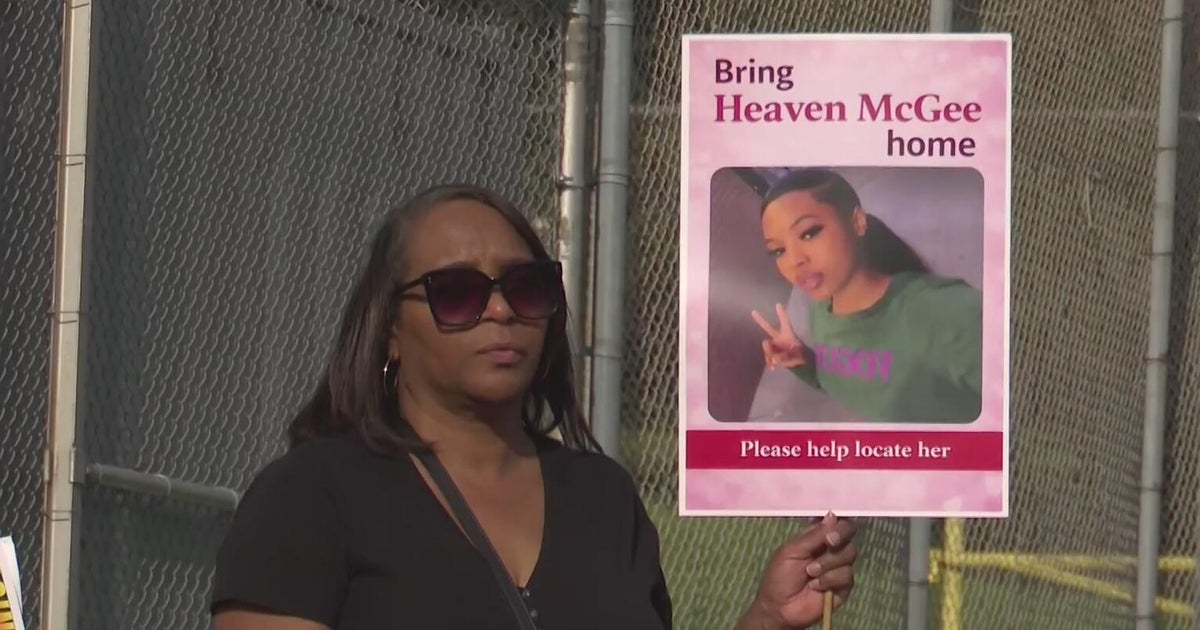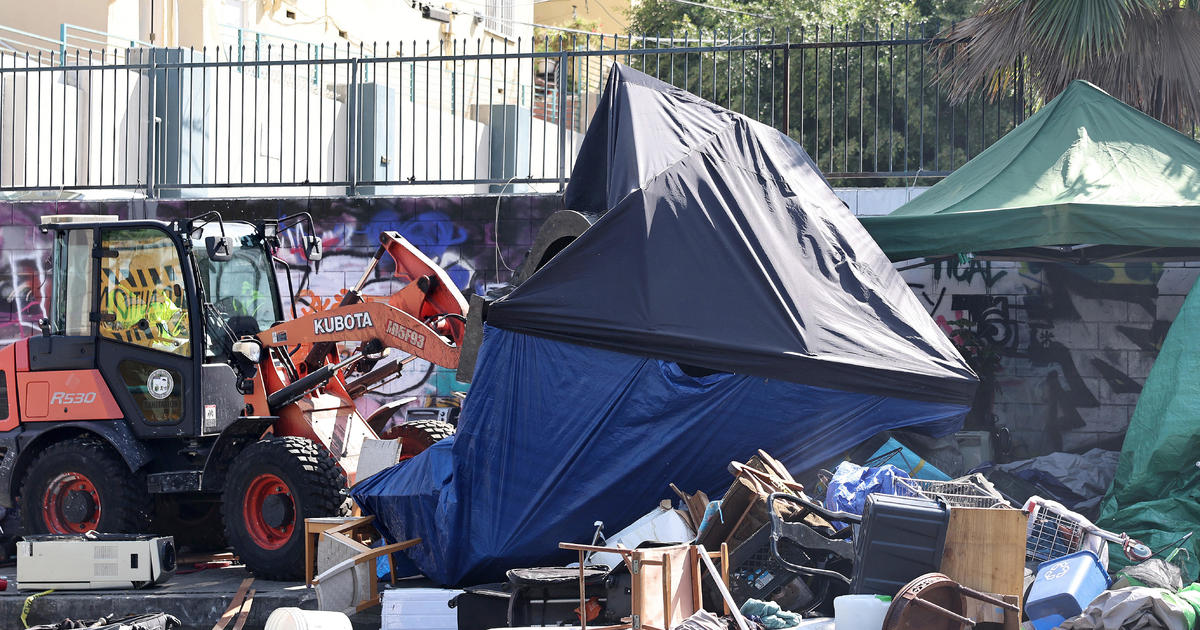Bay Area Family Mourns Death Of Relative At Hands Of Somali Pirates
SOUTH SAN FRANCISCO (CBS 5/ AP) -- The Bay Area family of a Pacific Northwest woman mourned her death and that of three others, including a Southern California couple, who died Tuesday at the hands of Somali pirates off the coast of East Africa.
U.S. authorities identified the slain Americans as Jean and Scott Adam, of Marina del Rey near Los Angeles, and Phyllis Macay and Bob Riggle, of Seattle, Washington.
Nina Crossland, the niece of Macay, spoke briefly to reporters in South San Francisco on Tuesday about her aunt. Crossland said Macay's family has been in close contact with the U.S. government since pirates on Friday captured the 58-foot yacht Quest that the four Americans were aboard.
"We are terribly distraught and devastated over this news," Crossland said. "The world is a very empty place without my aunt here."
Macay visited the Bay Area periodically and had taken past yacht trips to Bodega Bay.
Crossland described Macay as an adventurous woman, but someone who always did her research. She said it was still unclear why Macay and her three traveling companions were sailing in an area known for recent pirate attacks.
"Why they were in that area, we don't know, but she was not haphazardly out on the ocean, just loosely traveling around," the neice explained.
Crossland said she was told that the four had been traveling in a group of yachts but had left the group when the attack occurred.
A U.S. Navy destroyer was shadowing the hijacked yacht on Tuesday when gunfire erupted, the military said. U.S. special forces rushed to the yacht only to find the four Americans fatally wounded.
"My aunt was not dead when the Navy Seals arrived on the ship. She had been shot. She was not dead at that time and they did try to save her, but they were unsuccessful," Crossland told reporters.
KCBS' Bob Melrose Reports:
The experienced yacht enthusiasts from California and Washington were the first Americans killed by Somali pirates since the start of attacks off East Africa several years ago. The California couple on board had been sailing around the world since 2004 handing out Bibles.
Their deaths appeared to underscore an increasingly brutal and aggressive shift by pirates in their treatment of hostages.
Killing hostages "has now become part of our rules," said a pirate who identified himself as Muse Abdi.
"From now on, anyone who tries to rescue the hostages in our hands will only collect dead bodies," he said. "It will never ever happen that hostages are rescued and we are hauled to prison."
U.S. Secretary of State Hillary Rodham Clinton strongly condemned the killings, saying in a statement that the slayings were "deplorable" and underscored the need for international cooperation in fighting the scourge of piracy in waters off the Horn of Africa.
Pirates had hijacked the Quest south of Oman. Since then, four U.S. warships and sky-high drones shadowed the vessel's movement as pirates tried to sail it to the Somali shore. U.S. officials negotiated with the captors via radio.
But at 8 a.m. East Africa time Tuesday, a rocket-propelled grenade was fired from the Quest at the USS Sterett, a guided-missile destroyer 600 yards away. The RPG missed and almost immediately afterward small arms fire was heard coming from the yacht, said Vice Adm. Mark Fox, commander of the U.S. 5th Fleet in Bahrain.
Several pirates then appeared on deck with their hands up. U.S. naval forces boarded the vessel and tried to provide lifesaving care to the Americans, but they died, Fox said. No U.S. forces were injured or killed.
Thirteen pirates were captured and detained Tuesday, and two other pirates had boarded the USS Sterett on Monday to negotiate, Fox said.
A member of a U.S. special operations force killed one of the pirates with a knife, Fox said. A second pirate was also killed, and the bodies of two other pirates were discovered on board, bringing to 19 the total number of pirates involved. The U.S. military didn't say how those two died and it was not known if the pirates had fought among themselves.
Pirates have increased attacks off the coast of East Africa in recent years despite an international flotilla of warships dedicated to protecting vessels and stopping the pirate assaults.
But the conventional wisdom in the shipping industry had been that Somali pirates were businessmen looking for a multimillion-dollar ransom payday, not insurgents looking to terrorize people.
"We have heard threats against the lives of Americans before but it strikes me as being very, very unusual why they would kill hostages outright," said Graeme Gibbon-Brooks, the head of Dryad Maritime Intelligence, adding that the pirates must realize that killing Americans would invite a military response.
President Barack Obama, who was notified about the deaths at 4:42 a.m. Washington time, had authorized the military on Saturday to use force in case of an imminent threat to the hostages, said White House spokesman Jay Carney.
The Quest was the home of the Adams, who had been sailing around the world since December 2004. Macay and Riggle had recently joined them.
"Great sailors, good people. They were doing what they wanted to do, but that's small comfort in the face of this," said Joe Grande of the Seattle Singles Yacht Club, where Macay and Riggle were members.
Around Christmas the Quest joined the Blue Water Rally, an around-the-world race. But race organizers said the Quest recently left the race despite what Fox said were warnings about the dangers of sailing in the Horn of Africa region.
The Blue Water Rally said in a statement Tuesday that though yachtsmen are discouraged from sailing in the region, the only other choices are to sail around the stormy and dangerous tip of South Africa or sail back across the Pacific.
The Adams were skilled and experienced sailors, having traveled from Panama in 2005 to Fiji in 2007 and Cambodia last year. They most recently sailed from Thailand to Sri Lanka and India, and were on their way to Oman when captured.
Motivated by million-dollar ransoms, pirates have become increasingly bold in their attacks despite a flotilla of international warships patrolling the waters off East Africa. The last time pirates kidnapped a U.S. citizen - during the 2009 hijacking of the Maersk Alabama - Navy sharpshooters killed two pirates and rescued the ship's captain.
But Tuesday's bloody events are apt to leave U.S. military planners in a quandary: Do they go after the pirates harder? Do they attack their bases on Somalia's ungoverned shores? One maritime expert said it's too early to tell.
"This is a first," said Gibbon-Brooks, the analyst. "We don't know if the situation is related to a straight execution. We don't know if it was related to an attempt to break free. We don't know if it was related to an accident."
Gibbon-Brooks said the killings were "extremely unwise" by the Somalis, and that the deaths threaten what has been a successful and lucrative business model.
Two days before the hijacking, a New York court sentenced a pirate to 33 years in prison for the 2009 attack on the Maersk Alabama, a U.S. cargo vessel. A pirate in Somalia said last week that pirates were more likely to attack Americans because of the sentencing.
"It's a black day for us and also the Americans, but they lost bigger than us," a pirate who said his name was Bile Hussein said. "If they still want a solution and safety for their citizens in the oceans, let them release our men they arrested."
Only minutes before the military announced that the four Americans had died, a Somali pirate told the Associated Press by phone that if the yacht were attacked, "the hostages will be the first to go."
"Some pirates have even suggested rigging the yacht with land mines and explosives so as the whole yacht explodes with the first gunshot," said the pirate, who gave his name as Abdullahi Mohamed, who claimed to be a friend of the pirates holding the four Americans.
Pirates - who currently hold 30 ships and more than 660 hostages - typically win a multimillion ransom for releasing their captives, a huge sum that is shared among investors and pirates. The money is often spent on alcohol, drugs and prostitutes. One ransom paid last year was reported as $9.5 million. Most ransoms are worth several million dollars.
Given that typical financial motivation, Tuesday's killings left several unanswered questions, such as whether the pirates, being trailed by the Americans, believed there was no way to avoid spending years in a U.S. prison, or if the American forces spooked the pirates by approaching the yacht, or even if the hostages had tried to retake the yacht from the pirates.
The military said U.S. forces have been monitoring the Quest for about three days, since shortly after the Friday attack. Four Navy warships were involved, including the aircraft carrier USS Enterprise.
Mohamed, the pirate in Somalia, told AP that pirate leaders had been expecting the yacht to make landfall soon.
Five cars full of pirates were headed toward the pirate dens of Eyl and Gara'ad in anticipation of the Quest reaching land Monday, he said. Had the four reached land, they may have faced a long hostage ordeal like the 388 days that the British sailing couple Paul and Rachel Chandler spent in the hands of pirates. The two were released in November.
"This incident is a clear message and alarm that it's time the world community quickly steps up to stop these pirate criminal activities. They should be treated mercilessly," said Gen. Yusuf Ahmed Khayr, the security minister in the northern Somalia region of Puntland, a pirate haven.
The Adams ran a Bible ministry and had been distributing Bibles to schools and churches in remote villages in areas including the Fiji Islands, Alaska, New Zealand, Central America and French Polynesia.
At the Seattle Singles Yacht Club, friend Hank Curci said Macay and Riggle.
"Now that they're gone it's just difficult for us to accept because it's like having a family member killed," he said.
(© 2011 CBS Broadcasting Inc. All Rights Reserved. This material may not be published, broadcast, rewritten, or redistributed. The Associated Press contributed to this report.)







